The Amazing Music Lovers of Liverpool
by Charles A. Hooey
Note - you can view larger versions of all
the program bills in this article by clicking on the images
shown.
Imagine if you will, Auntie Mame and
Ida Cook rolled into one effervescent human being and you would
have John Robinson's beloved
Aunt Fay, a concert-goer par excellence and, in this
respect, she was a carbon copy of her mother Margaret!
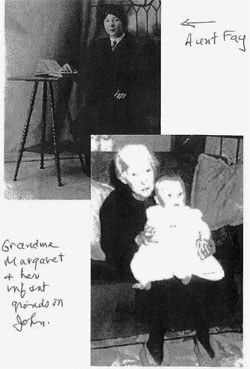 Francis (known to all as Fay) was born in 1900 in Liverpool,
where in time she would tag along with her mother, Margaret
Robinson, on her theatre excursions. The multitude and wealth
of events
these two ladies saw during the first part of the last century
fairly leaps from hundreds of crumbling programmes. The earliest
item, a ticket stub dated simply, "May 11", advises
that Margaret witnessed the "gun-totin' cowboys and gallopin'
hosses" Buffalo Bill brought to town with his American Wild
West Show in the mid-1890s.
Francis (known to all as Fay) was born in 1900 in Liverpool,
where in time she would tag along with her mother, Margaret
Robinson, on her theatre excursions. The multitude and wealth
of events
these two ladies saw during the first part of the last century
fairly leaps from hundreds of crumbling programmes. The earliest
item, a ticket stub dated simply, "May 11", advises
that Margaret witnessed the "gun-totin' cowboys and gallopin'
hosses" Buffalo Bill brought to town with his American Wild
West Show in the mid-1890s.
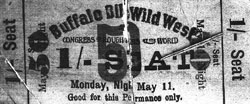
Quite early, Margaret was exposed to the arts,
thanks to the Right Honourable, the Lord Mayor of Liverpool
and the Lady
Mayoress (Mr. and Mrs. Louis S. Cohen) who invited her to an ‘At
Home’ at the Town Hall on 18 December 1899. In a varied
programme, she must have relished the classical songs by Madame
Nourry and F. Trowbridge. In 1901, amidst a welter of plays,
she heard the voice of rising English tenor, John Coates, on
11 March when he sang Valentin in Audran’s Olivette with
Leonora Braham as Bathilde, the Countess of Rousillon. About
two weeks later on 28 March, she attended a Grand Concert,
a gathering that involved the talents of singers, E. de Lara,
Robert
Cunningham, Emilie Young, Max Eugene and Ernest Troubridge.
This unique experience she surpassed on Good Friday, 5 April,
when
she attended a sacred concert, noteworthy if only for the number
of encores given, ten in all. Renowned Madame Marie Tietjens
sang ‘The Holy City’ and ‘There is a green
hill far away’ by Gounod, while bass Arthur Winckworth
intoned ‘O Divine Redeemer’ and the overly sentimental
song, ‘Daddy’. Other vocal contributions were by
George Platt, Mabel M. Wells, Robert Cunningham, Cissie Smith
and Charles Aspinall. Almost everyone supplied one or more
encores.
On 22 April, Margaret experienced the striking musical The
Geisha by Sydney Jones with Emma Boccardo as O Mimosa San,
Arthur Appleby as Reginald Fairfax, Ely Juarez as Juliette
Diamant and William Cromwell as Wun-Hi. Towards year’s
end on 11 November, she attended a performance of An Emerald Isle (or The
Caves of Carrig-Cleena), a comic opera set in 1800 Ireland,
with Dillon Shallard as The Earl of Newtown, Sydney Bracy as
Terence O’Brien, a young rebel, and Jessie Rose as Lady
Rosie Pippin. Another gem seen on 9 December was Leslie Stuart’s
popular Florodora with Amy Augarde as Dolores.
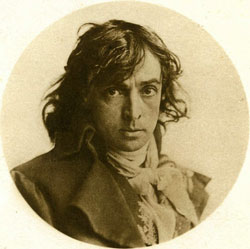 By
and large, however, Margaret’s early interest in the
arts lay in the work of noted thespians. Thus in 1901, she
saw The
Silver King; Mary, Queen of Scots; Nancy Oldfield & The
Lyons Mail; The Silver Slipper; The Second in
Command; The
Only Way (an adaptation of A Tale of Two Cities with
heart-throb Martin Harvey as Sydney Carton, pictured); Carmita; The
Worst Woman in London; The Night of the Party; When
we were twenty-one; Henry V; Oberine (The Nymph
of the Adriatic); Jack in the Beanstalk and For Auld
Lang Syne. Whew! Also, when a touring company from Terry’s
Theatre in London visited Liverpool on 4 November, Margaret
enjoyed the ‘eminent comedian Edward Terry’ in Sweet
Lavender by
A. W. Pinero as he portrayed Dick Phenyl, a barrister. This
role, ‘his
original part, he had portrayed for over 2000 nights in London,
the Provinces and the Colonies.’
By
and large, however, Margaret’s early interest in the
arts lay in the work of noted thespians. Thus in 1901, she
saw The
Silver King; Mary, Queen of Scots; Nancy Oldfield & The
Lyons Mail; The Silver Slipper; The Second in
Command; The
Only Way (an adaptation of A Tale of Two Cities with
heart-throb Martin Harvey as Sydney Carton, pictured); Carmita; The
Worst Woman in London; The Night of the Party; When
we were twenty-one; Henry V; Oberine (The Nymph
of the Adriatic); Jack in the Beanstalk and For Auld
Lang Syne. Whew! Also, when a touring company from Terry’s
Theatre in London visited Liverpool on 4 November, Margaret
enjoyed the ‘eminent comedian Edward Terry’ in Sweet
Lavender by
A. W. Pinero as he portrayed Dick Phenyl, a barrister. This
role, ‘his
original part, he had portrayed for over 2000 nights in London,
the Provinces and the Colonies.’
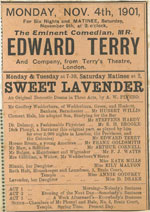
1902 began in a similar vein as Margaret attended a performance
of The Fenian by Hubert O’Grady on 3 January with
Faulkner Cox as Jack Lynch and Irish comedian Shaun Glenville
as Barney the Barracker. Then, in quick succession came London’s
Curse (10 February); The Milestones of Life (17
February); The
Toreador (3 March) and another performance of Shakespeare’s Henry
V (17 March).
Then,
it appears she experienced her first grand opera when the Moody-Manners
Opera Company presented Faust in Liverpool
on 7 April with a cast that included Charles Manners as Méphistophélès,
John Child as Faust, Ella Russell as Marguerite and William
Davies as Valentin, all under the guidance of conductor Harold
Vicars.
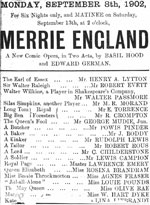 Continuing this musical pattern on 10 May, Margaret saw the
comic opera Chilperic with tenor Courtice Pounds in
the title role, followed by German’s Merrie England on
8 September with Henry Lytton as Earl of Essex, Robert Evett
as Walter Wilkens
and Rosina Brandram as Queen Elizabeth. Next, on 29 November,
she took in Shakespeare’s The Merchant of Venice with
fabled Henry Irving as Shylock and Ellen Terry as Portia. For
his efforts, Irving was rewarded in the press the following
day with this accolade: “He never sustained the character with
more force, pathos or conviction, and never had a more appreciative
audience.” Irving was seen as well in Lettie,
another musical creation by Arthur W. Pinero, but the programme
is undated.
Continuing this musical pattern on 10 May, Margaret saw the
comic opera Chilperic with tenor Courtice Pounds in
the title role, followed by German’s Merrie England on
8 September with Henry Lytton as Earl of Essex, Robert Evett
as Walter Wilkens
and Rosina Brandram as Queen Elizabeth. Next, on 29 November,
she took in Shakespeare’s The Merchant of Venice with
fabled Henry Irving as Shylock and Ellen Terry as Portia. For
his efforts, Irving was rewarded in the press the following
day with this accolade: “He never sustained the character with
more force, pathos or conviction, and never had a more appreciative
audience.” Irving was seen as well in Lettie,
another musical creation by Arthur W. Pinero, but the programme
is undated.
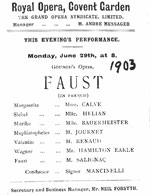 Of
sixteen plays seen in 1903, perhaps the most entertaining was
the romantic comedy David Garrick seen on 16 February
in the Star Theatre in Williamson Square with E. Hoggan-Armadale
in the title part. However, a trip to London that spring enabled
her to continue her operatic exploits at Covent Garden where
the Moody-Manners Company was ensconced, providing on 30 March
the double bill of Cavalleria Rusticana and Pagliacci with
two eminent tenors in action, Philip Brozel as Canio and Francis
MacLennan as Turiddu. Lola was sung by Florence Easton who
would become Mrs. MacLennan in May 1904. Santuzza was none
other than
Blanche Marchesi. After seeing A Country Girl with Sydney
Barraclough on 23 March 1903, she returned to Covent Garden
on 29 June to be charmed by Emma Calvé in Faust with
Messrs Salignac and Journet. Thoroughly hooked, she would in
years to come, queue at the box office for every opera she
could manage.
Of
sixteen plays seen in 1903, perhaps the most entertaining was
the romantic comedy David Garrick seen on 16 February
in the Star Theatre in Williamson Square with E. Hoggan-Armadale
in the title part. However, a trip to London that spring enabled
her to continue her operatic exploits at Covent Garden where
the Moody-Manners Company was ensconced, providing on 30 March
the double bill of Cavalleria Rusticana and Pagliacci with
two eminent tenors in action, Philip Brozel as Canio and Francis
MacLennan as Turiddu. Lola was sung by Florence Easton who
would become Mrs. MacLennan in May 1904. Santuzza was none
other than
Blanche Marchesi. After seeing A Country Girl with Sydney
Barraclough on 23 March 1903, she returned to Covent Garden
on 29 June to be charmed by Emma Calvé in Faust with
Messrs Salignac and Journet. Thoroughly hooked, she would in
years to come, queue at the box office for every opera she
could manage.
However in 1904, a mystery exists. Why did the lady, according
to a lack of programmes, settle for just a lone visit to the
Royal Hippodrome, there to be entertained by Nelson Hardy,
a ventriloquial impersonator; the Bros. Harrison vocalists,
patterers
and expert dancers; the three Rickards, continental acrobats;
the Great Zarmo, America’s droll juggling comedian and
other acts. She certainly did not neglect the bustling music-halls,
for in addition to the Hippodrome, she frequented the Empire
and Palace Theatres to take in such events as encapsulated
versions of Mikado and Gondoliers sandwiched between the
acts of comedians, fiddlers, acrobats, jugglers and balladeers.
But why no opera, concerts or the like that year? Or did she
neglect to save the programmes?
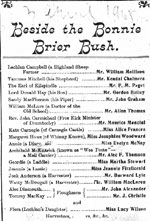 Back
on form in 1905, with more plays and musicals, on 6 March,
she saw ‘The London Fireman’ with Forbes
Knowles as Colonel Fleming, Edward Garside as Hal Curtis, Ella
Vine as
Grace Curtis and Violet Temple as Gladys Fleming. A week later
she took in The Duchess of Dantzic with Amy Augarde
as Catharine Upscher, later as the Duchess. On 27 March, she
saw ‘The
Tempest’ with William Haviland (Prospero), S. T.
Ewart (Alonzo) and Nora Kerin (Miranda). Then, on 3 April,
she was
on hand when the Scottish musical ‘Beside the Bonnie
Brier Bush’ was performed with the principal character
Jock Anderson, a harvester, portrayed by Scottish tenor Durward
Lely, though on this occasion he was listed as ‘Lyle.’ Attending
William Gillespie’s Clarice on 4 September, she
saw Lucille La Verne star as Judith Clancy. Next in the classic ‘Oliver
Twist’ on 16 October William Mackintosh was Fagin,
Webb Darleigh was Bill Sikes, Michael Sherbrooke was The Artful
Dodger and Gertrude Lang was Oliver.
Back
on form in 1905, with more plays and musicals, on 6 March,
she saw ‘The London Fireman’ with Forbes
Knowles as Colonel Fleming, Edward Garside as Hal Curtis, Ella
Vine as
Grace Curtis and Violet Temple as Gladys Fleming. A week later
she took in The Duchess of Dantzic with Amy Augarde
as Catharine Upscher, later as the Duchess. On 27 March, she
saw ‘The
Tempest’ with William Haviland (Prospero), S. T.
Ewart (Alonzo) and Nora Kerin (Miranda). Then, on 3 April,
she was
on hand when the Scottish musical ‘Beside the Bonnie
Brier Bush’ was performed with the principal character
Jock Anderson, a harvester, portrayed by Scottish tenor Durward
Lely, though on this occasion he was listed as ‘Lyle.’ Attending
William Gillespie’s Clarice on 4 September, she
saw Lucille La Verne star as Judith Clancy. Next in the classic ‘Oliver
Twist’ on 16 October William Mackintosh was Fagin,
Webb Darleigh was Bill Sikes, Michael Sherbrooke was The Artful
Dodger and Gertrude Lang was Oliver.
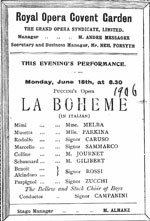 Thanks
to a repeat visit to Covent Garden in 1906, she was able on
18 June to watch Caruso and Melba interact in La Bohème.
Imagine her excitement! The next evening she was back to soak
up the velvet-tones of Kirkby Lunn as Carmen. Again
home in Liverpool, she welcomed the Moody-Manners Company on
6 August
when their Faust included Wilson Pembroke (Faust), Charles
Manners (Méphistophélès), Fanny Moody
(Marguerite) and Marshall Vincent (Valentin), all led by Romualdo
Sapio.
Thanks
to a repeat visit to Covent Garden in 1906, she was able on
18 June to watch Caruso and Melba interact in La Bohème.
Imagine her excitement! The next evening she was back to soak
up the velvet-tones of Kirkby Lunn as Carmen. Again
home in Liverpool, she welcomed the Moody-Manners Company on
6 August
when their Faust included Wilson Pembroke (Faust), Charles
Manners (Méphistophélès), Fanny Moody
(Marguerite) and Marshall Vincent (Valentin), all led by Romualdo
Sapio.
On 21 June 1907, she took in a performance at the Garrick Theatre
of The Truth, a comedy that featured the redoubtable
Marie Tempest as Becky Warder. At the Savoy, the next night,
she saw Iolanthe with
C.H. Workman (the Lord Chancellor),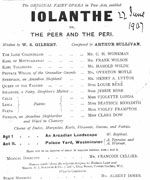 Henry Lytton (Strephon),
Harold Wilde (Earl Tolloller) and Miss Louie Réné (Queen
of the Fairies), conducted by Francois Cellier. Two nights
later a theatre visit yielded a viewing of The Walls of Jericho by
Alfred Sutro. That autumn Moody-Manners came calling again,
allowing Margaret to see an Aida on 30 September with
Joseph O’Mara
as Radames, Clementine de Vere Sapio as Aida, Lewys James as
Amonasro, Toni Seiter as Amneris and Charles Manners as Ramphis.
The soprano’s husband again conducted. On 10 October
she had a chance to see heart-throb Martin Harvey again as
Count
Skaratine in A Cigarette Maker’s Romance with
N. de Silva as Viera. On 2 December, she re-visited Faust with
Charles Magrath as the Devil, O’Mara as Faust and Fanny
Moody as Marguerite.
Henry Lytton (Strephon),
Harold Wilde (Earl Tolloller) and Miss Louie Réné (Queen
of the Fairies), conducted by Francois Cellier. Two nights
later a theatre visit yielded a viewing of The Walls of Jericho by
Alfred Sutro. That autumn Moody-Manners came calling again,
allowing Margaret to see an Aida on 30 September with
Joseph O’Mara
as Radames, Clementine de Vere Sapio as Aida, Lewys James as
Amonasro, Toni Seiter as Amneris and Charles Manners as Ramphis.
The soprano’s husband again conducted. On 10 October
she had a chance to see heart-throb Martin Harvey again as
Count
Skaratine in A Cigarette Maker’s Romance with
N. de Silva as Viera. On 2 December, she re-visited Faust with
Charles Magrath as the Devil, O’Mara as Faust and Fanny
Moody as Marguerite.
During
the next two years, Margaret must have been otherwise engaged
as just one programme exists. It reveals she saw Lohengrin by
Moody-Manners on 28 September 1908 with Brozel, de Vere Sapio
(Elsa), William Dever (Telramund), Charles Magrath (King) and
Mary Louise Roger (Ortrud), led by Richard Eckhold.
Her sabbatical seems to have ended on January 8, 1910 with
Mendelssohn’s Elijah, again
a product of Moody-Manners as dramatized by Harrison Frewin.
The soloists were Graham Marr, Florence Morden, Wilson Pembroke
and Harry Brindle. On Monday, 4 April, she saw Tannhäuser with
O’Mara in the title role, de Vere Sapio as Elizabeth
and Lewys James as Wolfram. Three nights later she attended
an Il
Trovatore with Brozel as Manrico, de Vere Sapio as Leonora,
Mary Louise Roger as Azucena and Charles Moorhouse as Di Luna
with Hawley conducting.
That summer, she journeyed to a mystery location (not shown
on the programme) to see four operas, beginning with Il Trovatore on
16 May with Signora Protti (Leonora), Signor Barbato (Manrico)
and Mme. Corretta Castellano (Azucena). Two nights later, Il
Barbiere di Siviglia featured Signorina Bianchi (Rosina),
Signor Bartera (Almaviva), Signor Vail (Figaro), Signor Quintina
(Dr. Bartolo) and Signor Vitton (Don Basilio). Next, on 23
May, she was present for a Lucia di Lammermoor with
Signorina Bianchi, Signor Sioli and Signor Vittori. Finally,
on 26 May,
Signora Protti, Signor Sioli, Signor Vittori and Signor Vail
as Valentine provided a performance of Faust.
In November, Margaret seated herself in the Royal Court Theatre
to watch as Beecham's Opera-Comique Company presented The
Tales of Hoffmann. Especially fine were the delicious voice
and antics of Caroline Hatchard as Olympia, the brilliance
of John Bardsley as Hoffmann, ill-fated W. J. Samuell as Dappertutto
and a delightful Edith Evans as Giulietta and Antonia. Hawley
conducted.
Late the following year the Quinlan Opera came to visit on
10 October, enabling Margaret to see Tannhäuser again,
this time with John Harrison in the title role, Bettina Freeman
(Elizabeth), Vera Courtney (Venus), Allen Hinckley (Landgrave)
and Robert Parker (Wolfram) with Cuthbert Hawley conducting.
Meanwhile American Oscar Hammerstein had been giving a season
of opera at his newly-built edifice, the London Opera House.
During his second season in 1912, Margaret was on hand on 6
May for La Favorita with Augusta Doria as Leonora di
Guzman, Orville Harrold as Fernando and Henry Weldon as Baldassare,
conducted
by Fritz Ernaldy. Harrold’s soon-to-be wife Lydia Locke
portrayed Inez. Margaret returned on 27 May to see The Tales
of Hoffmann, now sung in French by Frank Pollack (Hoffmann),
Bertha César (Olympia), Victoria Fer (Antonia) with
Vilmos Beck (Dappertutto, Coppelius and Dr. Miracle). Gaetano
Merola
conducted. The season included Rigoletto, Don Quichotte, The
Barber of Seville, Faust and The Children of Don,
although apparently Margaret saw none of these productions.
During a re-visit to her mystery venue on 18 September, Margaret
saw Carmen with Signora Gorreta, Signor Ferri (Don José),
Signora Defral (Micaëla) and Signor Terrasi (Escamillo).
Again at this location on 30 October, she witnessed a Lucia
di Lammermoor sung by Signora Gavlosca, Signor Ferri and
Signor Terrasi.
Musical legends often swept into town. On 23 September, 1912,
Margaret witnessed the ‘dancing revelation of the age Anna
Pavlova’ backed by Novikoff and members of the Imperial
Russian Ballet. Fritz Kreisler cradled his violin, Peter Dawson
sang in concert with another fine violinist Renée Chemet
while Maggie Teyte, Louise Kirkby Lunn, Leila Megane and Clarence
Whitehill gave solo concerts.
The venerable British opera, Balfe’s The Bohemian Girl,
was quite often performed at this time. Margaret saw the opera
on 26 December 1912 with Graham Marr, Raymonde Amy and William
Anderson conducted by Richard Eckhold. On 13 February 1918,
she was able to introduce Fay to this music.
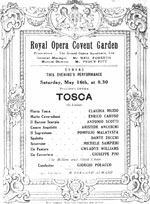 More
visits to London in 1913, possibly with Fay, provided Emmy
Destinn as Senta in Der Fliegende Hollander at
the Garden, while down the road at Drury Lane Theatre, courtesy
of Sir Joseph
Beecham, they were likely bowled over by Chaliapin's Boris
Godounov. The following year on 16 May, they saw Caruso,
now world famous, romancing Claudia Muzio in Tosca with
Scotti as the evil Scarpia.
Two days later, Margaret found herself in Paris taking in an
unusual work, the lyric drama Scemo by Charles Méré and
Alfred Bachelet with Yvonne Gall as Francesca and M. Altchevsky
as Scemo.
More
visits to London in 1913, possibly with Fay, provided Emmy
Destinn as Senta in Der Fliegende Hollander at
the Garden, while down the road at Drury Lane Theatre, courtesy
of Sir Joseph
Beecham, they were likely bowled over by Chaliapin's Boris
Godounov. The following year on 16 May, they saw Caruso,
now world famous, romancing Claudia Muzio in Tosca with
Scotti as the evil Scarpia.
Two days later, Margaret found herself in Paris taking in an
unusual work, the lyric drama Scemo by Charles Méré and
Alfred Bachelet with Yvonne Gall as Francesca and M. Altchevsky
as Scemo.
Benedict’s Lily of Killarney, another now largely
forgotten Victorian comic opera, seems to have appealed to
the Robinsons as they saw it in 1915, 1917 (twice) and in 1918
when
Lewys James appeared as Danny Mann.
A Savoyard in his youth, tenor Walter Hyde had advanced to
grand opera when Fay saw him first as Fra Diavolo in
1915 and then as Romeo in 1916 during visits by Moody
Manners. The following year, Hyde came with the H.B. Phillips
Company
to sing Canio but took ill so Frank Mullings sang instead.
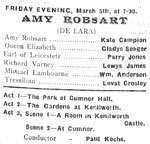 When
McMurragh’s opera Shaun the Post was staged
for the first time in Britain on 25 February 1915, Margaret
was present to watch Ben Williams portray Shaun, Appleton Moore
as
Colonel O’Grady and Frederick Glendon as Michael Feeney.
André Skalski conducted. Later that year, the Carl Rosa
Opera visited Liverpool where Margaret, and perhaps Fay, saw
Ambroise Thomas’s Mignon on 3 December with Beatrice
Miranda and Hughes Macklin leading the forces on stage. Since
Fay began tagging along, she seems to have developed a crush
on a certain luscious-voiced baritone for she saw Lewys James
a total of twenty-three times! In addition to standard roles,
he appeared in De Lara's Amy Robsart and The Attack
on the Mill by Alfred Bruneau, tuneful but forgotten relics
today, and in a double bill: The Storm-Wrack by James
Lyon and The Witch Dancers (Puccini's Le Villi)
when it was first given in Liverpool by the H.B. Phillips Company
on 9 April 1918.
When
McMurragh’s opera Shaun the Post was staged
for the first time in Britain on 25 February 1915, Margaret
was present to watch Ben Williams portray Shaun, Appleton Moore
as
Colonel O’Grady and Frederick Glendon as Michael Feeney.
André Skalski conducted. Later that year, the Carl Rosa
Opera visited Liverpool where Margaret, and perhaps Fay, saw
Ambroise Thomas’s Mignon on 3 December with Beatrice
Miranda and Hughes Macklin leading the forces on stage. Since
Fay began tagging along, she seems to have developed a crush
on a certain luscious-voiced baritone for she saw Lewys James
a total of twenty-three times! In addition to standard roles,
he appeared in De Lara's Amy Robsart and The Attack
on the Mill by Alfred Bruneau, tuneful but forgotten relics
today, and in a double bill: The Storm-Wrack by James
Lyon and The Witch Dancers (Puccini's Le Villi)
when it was first given in Liverpool by the H.B. Phillips Company
on 9 April 1918.
Once again, as the Robinsons looked on, a visiting Moody-Manners
company presented Tschaikovsky’s Eugene Onegin on
14 January 1916 with a cast comprising Hubert Dunkerley (Onegin),
Fanny Moody (Tatiana), Furness Williams (Lenski), Harry Brindle
(Gremin) and Enid Cruikshank (Olga). Aylmer Buesst presided.
When Sir Thomas Beecham brought his opera company to Liverpool
to serve up a matinee Rigoletto on 26 December 1917,
Fay could enjoy Lewys James as the hunchback with Nora D’Argel
as Gilda and Gwynne Davies as Duke of Mantua.
Their only Mozart opera, as evidenced by a programme, was The
Marriage of Figaro on 21 February 1918 and perhaps they
came as Lewys James portrayed Figaro with Florence Morden (Countess),
Albert Kirkman (Count), Enid Cruikshank (Susanna) and Herbert
Talbot (Bartolo). Next, Margaret and Fay were no doubt delighted
to attend the Grand Gala on 17 June 1918 that celebrated the
centenary of Gounod, who was born on that date in 1818. The
opera
was his most famous: Faust, with Ethel Austen as Marguerite,
E. C. Hedmondt (Faust), Kingsley Lark (Méphistophélès),
Charles Manners (Valentin) and Olive Westwood (Siebel).
The ladies caught up to James again on 19 January 1919 when
he appeared as Peter in Humperdinck’s Hansel and Gretel with
Esther Yunson (Gertrude), Enid Cruikshank (Hansel), Evelyn
Bailey (Gretel) and Nelly Watt (the Witch). On 15 April, they
saw Carl
Rosa’s first performance in England of Stella Maris, an
opera by Alfred de Keyser with Beatrice Miranda (Marga), William
Boland (Yanik) and Kingsley Lark (Silvain), conducted by Henriquez
de la Fuente. They chalked up more Puccini on 18 October when Manon
Lescaut had its initial airing in Liverpool. Dorothy Phillips
was Manon, Charles Neville Des Grieux, Wilfred Davies Lescaut
and John C. Browner Geronte. Their list was expanded when Rosa
returned on 27 November to present Nicolai’s Merry Wives
of Windsor with Beatrice Miranda, Arthur Winckworth and
Florence Barron. The next evening they witnessed the progress
of a rising
star, Eva Turner, whom they had seen as Venus in Tannhäuser two
years earlier; now she sang Thérèse in Somerville’s
medieval age opera The Miracle (or The Story of Antoine) with
Hughes Macklin as Paul, Kingsley Lark as Antoine and Arthur
Winckworth as the Curé.
During a visit to Malta in 1922-3, they discovered that the
Theatre Royal was presenting local forces in Rigoletto with
A. Chiappini (the Duke), L. Piazza (Rigoletto), A. Boccanera
(Gilda)
and B. Carmassi (Sparafucile) conducted by Luigi Cantoni, so
they purchased tickets. Back home the newly-created British
National Opera was beginning to flourish, so when they visited
Liverpool
on 20 February 1922 to perform Aida, the ladies made
sure they saw Beatrice Miranda as Aida, Frank Mullings as Radames,
Evelyn Arden as Amneris, Powell Edwards as Amonasro and Norman
Allin as Ramphis. Percy Pitt conducted.
To celebrate Easter in 1923, they journeyed to London on 30
March, for a Good Friday performance of Handel’s Messiah by
the Royal Choral Society at Royal Albert Hall featuring soloists
Ruth Vincent, Walter Hyde, Edna Thornton and Norman Allin with
Eugène Goossens as conductor.
Frequently at the opera in 1925, our ladies were in attendance
when the British National Opera came to Liverpool to present
Debussy’s Pelléas and Mélisande 17
February. Perhaps they were drawn by the presence of likable
Walter Hyde as Pelléas with Sylvia Nelis (Mélisande),
Robert Parker (Golaud) and Norman Allin (King Arkel). The next
night they returned to see Hugh the Drover by Vaughan
Williams with Tudor Davies as Hugh, May Blyth as Mary and William
Anderson as the Constable. On 20 February, they took in Rimsky
Korskoff’s The Golden Cockerel and on 5 March
Rutland Boughton’s Alkestis with Hyde as Admetus,
Muriel Brunskill (Alkestis) and Robert Parker (the God Apollo).
Finally
on 1 April, they watched Frank Mullings as Otello manhandle
Miriam Licette as a scheming Iago (Herbert Langley) gloated.
Julius
Harrison conducted.
Then, when the London Syndicate of Opera gave a season at Covent
Garden in June and July of that year, the Robinsons attended
five performances. On June 10, they saw Bruno Walter conduct
Richard Strauss’s Der Rosenkavalier with Gertrude
Kappel as the Marschallin, Richard Mayr as Baron Ochs and Delia
Reinhardt as Octavian. The next evening it was Der Fliegende
Hollander with Frida Leider (Senta), Friedrich Schorr (Dutchman),
Fritz Soot (Erik) and Otto Helgers (Daland), Robert Hager conducting.
On July 1, they took their seats to enjoy a performance of Il
Barbiere di Siviglia with Toti Dal Monte (Rosina), Ernesto
Badini (Figaro), Dino Borgioli (Conte d’Almaviva), Mugnone
conducting. On 2 July, it was Andrea Chénier with
Giacomo Lauri Volpi in the title role, Margherita Sheridan
as Maddelena and Benvenuto Franci as Gérard with Dennis Noble
doing double duty as both Fléville and Dumas. Finally,
on the next evening, they relished Elisabeth Rethberg’s
Cio-Cio-San with Franco lo Giudice (Pinkerton), Ernesto Badini
(Sharpless) with Sergio Failoni conducting.
In September 1926, the ladies, perhaps Fay alone, spent three
idyllic weeks in Lucerne, Switzerland, literally awash in music.
Herr J. Breitenbach at the organ led off in sprightly fashion.
Then, the extravaganza unfolded with music by the Italian Kursal
Orchestra conducted by Cav. Angelo Fumagalli of Scala, Milan.
All day long, familiar melodies and those less so, wafted on
the autumn breezes, joyfully embracing the hearts of all those
who listened.
In 1927 the musical My Son John by Oscar Strauss brought
delight at the Shaftesbury Theatre on 19 March with Billy Merson
as Benjamin Littlewood. So did an organ recital by H. Moreton
at Plymouth Guild Hall on 8 September.
John Robinson: “I cannot quite remember when my Grandmother
died. I was about 11 so it must have been about 1965. She was
a lovely, old Irish lady, well into her 90s. I remember she was
always dressed in black …”He described his Aunt Fay
as "a very clever person who wanted to make music her life.
She studied the piano and emerged wearing the cap and gown of
success. She would entertain us for hours." Fay had a
beau who survived the trench horrors only to perish soon after
on
an English roadway. She never married; instead, she became
a personal hair carer while continuing her love of the stage.
In the thirties, the musical play Lilac Time became
Fay’s
all-time favourite. Blessed with music by Schubert, it was
revived in London at the Globe Theatre on 26 December 1932
with Maurice
d'Oisly as Schubert, Rose Hignell as Lili and Percy Heming
as Shober. Nor did she miss revivals in 1933, 1934 and 1935.
John also recalled how "Much later when I was about four
or five, she would take me to the ballet or to G&S on a
Saturday afternoon, followed by tea in the Kardoma Cafe in
Liverpool,
a real treat. We also saw all the musicals, but it was not
until I was a bit older that I started to accompany Aunt Fay
to the
opera, Sadler's Wells in the 60s, I think. When I began to
work at 15, it was a great pleasure to treat my Aunt to a theatre
visit, but she'd always have tickets for the following week.
My Aunt Fay died in 1976. I still miss her..."
The programmes reveal a few Gilbert & Sullivan operas attended
in the 1920s. Let the names of Henry Lytton, C.H. Workman, Robert
Evett, Leo Sheffield and Bertha Lewis, in both G & S and
in Merrie England, evoke those glory days and perhaps
you will think of someone like John's folks … yes, like
Fay, John became a hair stylist with his own Liverpool shop.
No surprise: he retains a keen interest in opera to this day.
Notes
1. Not detailed or mentioned are several La Bohème,
Tosca, Madama Butterfly, Faust, Rigoletto, Il Trovatore, Cavalleria
Rusticana/Pagliacci and
other additional performances.
2. An earlier version of this article with emphasis on Gilbert & Sullivan
works was rejected by the Sullivan Journal. The author altered it to one of
a general nature and expanded it considerably for presentation here.














 Francis (known to all as Fay) was born in 1900 in Liverpool,
where in time she would tag along with her mother, Margaret
Robinson, on her theatre excursions. The multitude and wealth
of events
these two ladies saw during the first part of the last century
fairly leaps from hundreds of crumbling programmes. The earliest
item, a ticket stub dated simply, "May 11", advises
that Margaret witnessed the "gun-totin' cowboys and gallopin'
hosses" Buffalo Bill brought to town with his American Wild
West Show in the mid-1890s.
Francis (known to all as Fay) was born in 1900 in Liverpool,
where in time she would tag along with her mother, Margaret
Robinson, on her theatre excursions. The multitude and wealth
of events
these two ladies saw during the first part of the last century
fairly leaps from hundreds of crumbling programmes. The earliest
item, a ticket stub dated simply, "May 11", advises
that Margaret witnessed the "gun-totin' cowboys and gallopin'
hosses" Buffalo Bill brought to town with his American Wild
West Show in the mid-1890s. 
 By
and large, however, Margaret’s early interest in the
arts lay in the work of noted thespians. Thus in 1901, she
saw The
Silver King; Mary, Queen of Scots; Nancy Oldfield & The
Lyons Mail; The Silver Slipper; The Second in
Command; The
Only Way (an adaptation of A Tale of Two Cities with
heart-throb Martin Harvey as Sydney Carton, pictured); Carmita; The
Worst Woman in London; The Night of the Party; When
we were twenty-one; Henry V; Oberine (The Nymph
of the Adriatic); Jack in the Beanstalk and For Auld
Lang Syne. Whew! Also, when a touring company from Terry’s
Theatre in London visited Liverpool on 4 November, Margaret
enjoyed the ‘eminent comedian Edward Terry’ in Sweet
Lavender by
A. W. Pinero as he portrayed Dick Phenyl, a barrister. This
role, ‘his
original part, he had portrayed for over 2000 nights in London,
the Provinces and the Colonies.’
By
and large, however, Margaret’s early interest in the
arts lay in the work of noted thespians. Thus in 1901, she
saw The
Silver King; Mary, Queen of Scots; Nancy Oldfield & The
Lyons Mail; The Silver Slipper; The Second in
Command; The
Only Way (an adaptation of A Tale of Two Cities with
heart-throb Martin Harvey as Sydney Carton, pictured); Carmita; The
Worst Woman in London; The Night of the Party; When
we were twenty-one; Henry V; Oberine (The Nymph
of the Adriatic); Jack in the Beanstalk and For Auld
Lang Syne. Whew! Also, when a touring company from Terry’s
Theatre in London visited Liverpool on 4 November, Margaret
enjoyed the ‘eminent comedian Edward Terry’ in Sweet
Lavender by
A. W. Pinero as he portrayed Dick Phenyl, a barrister. This
role, ‘his
original part, he had portrayed for over 2000 nights in London,
the Provinces and the Colonies.’ 






